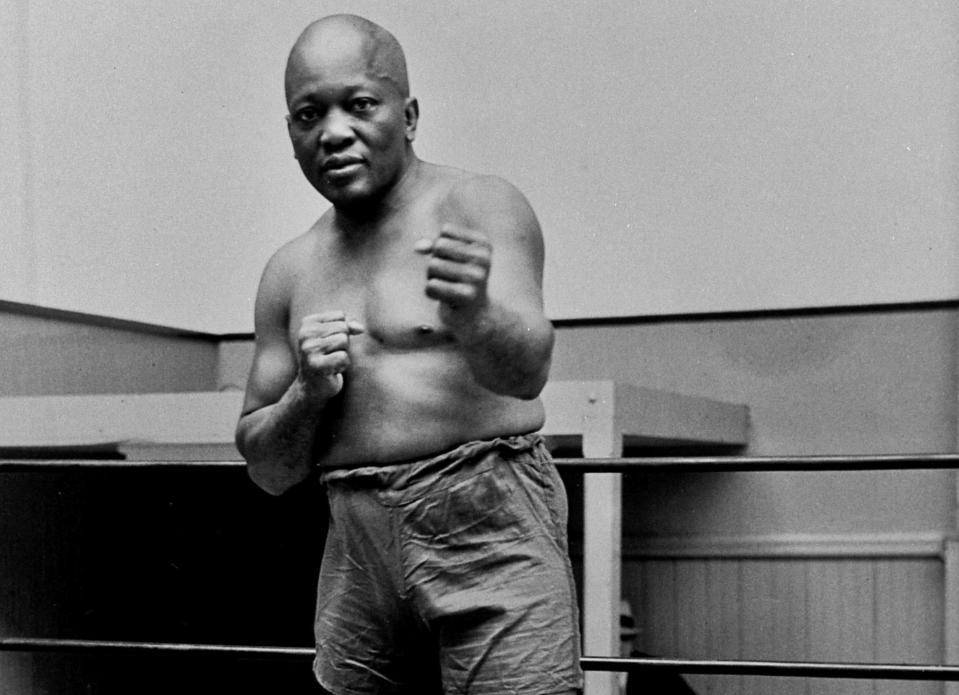President Trump's pardon of Jack Johnson is as welcome as it was unexpected

There is a particular irony in the fact that it took President Donald Trump, hardly a champion of rights for African-Americans and other racial minorities, to be the one who pardoned former heavyweight champion Jack Johnson.
An African-American who is among the greatest heavyweight boxers of all time, Johnson was convicted by an all-white jury in 1913 of violating the Mann Act, which was enacted in 1910 and made it a felony to transport a woman across state lines for “immoral purposes.”
His conviction was a glaring miscarriage of justice and many, notably Sen. John McCain (R-Ariz.) and filmmaker Ken Burns, have championed Johnson’s cause and pushed for a pardon. Congress passed a resolution in 2015 calling for Johnson’s pardon, but President Obama didn’t sign it.
Eric Holder, who was President Obama’s attorney general from 2009 through 2015, told WPIX in New York in 2016 that allegations of domestic violence against Johnson made him difficult to pardon.
“Jack Johnson no question was convicted unfairly,” Holder told WPIX. “That might be a historical injustice that might need to be rethought.”
But Holder then brought up the domestic violence issue, noting, “There are on the other side countervailing concerns about the way [Johnson] treated women, physically treated women. So all of this has to be balanced before this president or his successor would make a determination that a pardon is appropriate.”
Johnson’s conviction, though, clearly was a sham and was a wrong that needed to be corrected. Burns released a statement lauding the decision:
“It is the right thing to do. I’m just so happy that Senator John McCain, who has led our efforts to achieve a posthumous pardon for Jack Johnson, has lived to witness this moment. The pardon announced today helps correct an injustice experienced by Jack Johnson. But it also reminds us of a racist past and how even today racist remarks and coded words are used to imperil African Americans, especially black men, and to advance an un-American agenda.”
Johnson was Muhammad Ali more than 30 years before the boxer who would go on to become known as “The Greatest” was born. Like Ali, Johnson was a heavyweight champion who had uncommon speed, quickness and movement for a man who was 6-foot-1 and weighed around 210 pounds.

At the turn of the 20th century, that was large for a heavyweight of that era. But Johnson had the agility, footwork and hand speed of men 40 and 50 pounds lighter, and so he was a dominant fighter in his peak.
Deontay Wilder, the reigning WBC heavyweight champion, attended the White House pardoning ceremony on Thursday and said, “It meant a lot to me to be there to be a part of it.”
Wilder called Johnson “the original TBE,” in a nod to Floyd Mayweather, who dubbed himself “TBE” as in “The Best Ever.” Wilder said he spoke to Hall of Famer Lennox Lewis, another ex-heavyweight champion who attended the ceremony, about Johnson’s talent.
“I don’t know a whole lot about the kind of boxer he was because that was a long time ago, but I have seen highlights of him and you can see he was a force in [the ring],” Wilder told Yahoo Sports in a brief phone conversation. “Lennox told me he was one of the best. Ali got a lot of his stuff from [Johnson]. He was the original. He was the original TBE.
“He was the guy who came up with it all. He had his style and his swagger and he was the first to do that. Now, everybody talks and everybody wants to do their thing in there, but he was the guy who started it all. It was amazing for me to see this, to see a guy after all these years and all these presidents that could have done it but not to do it, for this to happen for him now. It was good to see.”
The pardon was many years late, and unfortunate that it didn’t happen during Johnson’s lifetime. Johnson, who fought exhibition matches until he was 67, died in 1946 in Franklinton, North Carolina. He left a diner that refused to serve him because of his race and died in an auto accident as he was leaving town.
Ali was only 4 when Johnson died, but referred to Johnson as “The Greatest,” in several interviews.
Trump’s decision is as welcome as it was unexpected. While posthumous presidential pardons are rare – Johnson’s is only the third ever – it was a stain on this country that needed to be removed.
It was largely symbolic, and there are scores of unfairly convicted minorities sitting in jails who could desperately use a pardon who will never get it.
That should never be forgotten, even as Trump’s signature on the pardon papers should be celebrated.
More from Yahoo Sports:
• Trump: Maybe NFL protesters ‘shouldn’t be in the country’
• Charles Robinson: What did the NFL hope to gain from Kaepernick poll?
• Footage of Bucks player’s arrest released
• Terez Paylor: NFL players react to league’s new anthem policy


